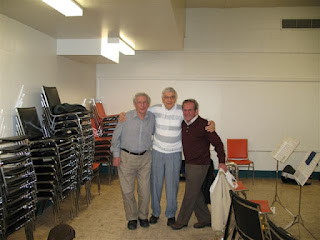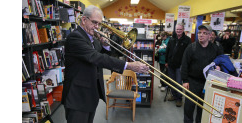
Menu:
Our Stories and Anecdotes
The Trail Maple Leaf Band has always tried to maintain a
strong social aspect to being a member of the group; to be more than just a
collection of 40 individuals playing music.
These days we have “bun nights” (impromptu luncheons after rehearsal)
several times a year and a family picnic at the end of June. But to hear some of the senior members talk
and to read some stories submitted from our alumni about times now past, when
the band used to “go on the road”, one
would believe that band members used to have a great deal of fun and
misadventure in “the old days”. Some of these stories are included below.
If you have any entertaining stories about the Band, that
you would like to share with the readers of this webpage, then please forward
those to the Webmaster or any member listed on the Contacts page.
| From the Trail Daily Times, June 26, 1969 | From Bob Bertuzzi | |
|---|---|---|
|
One of the most memorable of the band's trips was in spring of 1938 when they accompanied the Trail Smoke Eater hockey team to Calgary to watch them win the Allan Cup. The band was an instant sensation and its members became almost as famous as the Trail hockey players. They were called upon for innumerable impromptu concerts and proved a delight to the citizens of Calgary. During a trip to Kamloops, the band was requested to make a visit to nearby Tranquille, then a TB sanitorium. The patients were so delighted with the performance that they kept the band playing for hours. Several weeks later, the received from the women patients a carefully made scrapbook containing clippings of every activity of the band the women could find. |
Back in the late fifties, when I was a young high school student in the Maple Leaf Band, we went to Kelowna to play for the Kelowna Regatta. The band rented a bus, and we went off to Kelowna. I remember we stayed in some kind of a military barracks, as it had double bunk beds. We played a parade (I think that was the year we won first prize for best marching group even though there was a military band in the parade), and in the evening we had dinner at a restaurant on the lake with a live dance band playing in the background. That night we had a great jam session which went on till the wee hours of the morning. The pipe band (not sure if it was from Trail or the Okanagan) came in and joined us. Talk about loud...:) The band went to play a parade and concert in Greenwood. It was early morning, and we were lining up, getting ready for the parade. Next to us were several horses (of course the band was always behind the horses...). As we were preparing to go, Lorne DePaolis was warming up on his trumpet. He played a horse neigh. Neeeeeeeeeeh. Wouldn't you know it, the horse behind him let out a similar Neeeeeeeeeeh. It took a few minutes for everyone to stop laughing. Lorne always did like to 'horse around.' |
|
| From the Trail Times, May 8, 1990 | ||
|
When most of the band members worked for Cominco in the 1930s they had a train donated to them by Cominco for trips to Nelson or other locations such as Vancouver. Members of the public also rode along to Nelson to hear the concerts played at Lakeside Park. Mills Baldassi remembers one train trip to Vancouver fondly. The band bought a keg of beer to make the trip go faster. However, the main thing to go fast was the keg of beer. |
||
| From the Trail Times, April 24, 1992 | ||
|
Amerigo "Hammer" Guidone joined the band when he was only ten years old in the late 1920s. He had no choice, he points out. Italian immigrants in the Gulch had imported a "Maestro Colistro" - a musician from Italy - to teach all their little offspring a variety of instruments. Guidone was told he had to play the flugelhorn. "He just looked at your lips and then he picked the instrument you were going to play." Guidone switched to the drums while still a boy, then to the alto sax in 1967. Following the first maestro, the first - and by all reports the most ferocious - conductor was Tito Allegra. He thought nothing of using his conducting baton on any head that was not showing proper interest. But Allegra was more than a strong disciplinarian. Raz Truant, one of the band's clarinet players, said that if any lad was having trouble handling the notes, Allegra would erase them with his fingernail from the sheet music and write in new notes that the boy could handle. In the early days when they took their own vehicles, they might get up at two o'clock in the morning to drive over to places such as Kelowna for the eleven o'clock parade, Raz Truant said. "And the flat tires we used to have, trying to get over the Anarchist summit!" Lorne DePaolis said he and a buddy ended up hitchhiking to Kamloops one time when one of the vehicles broke down. They found a traveling salesman in a bar at Osoyoos, who agreed to take them to Kamloops, as long as they didn't mind stopping in at a Kelowna winery on the way. "We were the last to leave Osoyoos and the first to arrive at the parade site," DePaolis reminisces about the salesman's driving.  Raz Truant, Lorne DePaolis, and Jack Vellutini They came close to missing a parade altogether one year in Nakusp. DePaolis: "We were sitting there, just eating pancakes." Truant chimes in: "But they had changed the time of the parade and never told us." Finally being aware of the time change, the boys in the band managed to catch up to the parade - now in full progress - by racing down a back alley and sidling into the middle of the action. Good thing they did. "We were the only band in that whole parade," DePaolis said thoughtfully. "They would have really missed us...pretty silent." They lost a trumpet once, traveling up the Slocan Valley for some celebration. They were by then traveling on the old and decrepit Smoke Eaters bus. Rattling along the bumpy roads, one of the side storage compartments popped open and the horn popped out. The young band member whose trumpet it was, managed to borrow one for the parade, but was down in the dumps, thinking his trumpet was gone forever. But the man driving the car behind the bus noticed the fly-away trumpet, stopped and picked it up and returned it to the boy before the day was over. |
| From Globe and Mail (Victoria), March 20, 2012 |
|---|
King of books retiring, but still blows his own horn
Sharman King is the goofy guy with frizzy hair who honks a tuba in television commercials for his chain of discount bookstores. He still gets stopped on the street by people who recognize him from advertisements that haven’t aired in more than a decade. His televised tuba-playing was rudimentary, often featuring little more than a bleat, a honk, or a squeak. He was being playful. Mr. King is an accomplished musician, a fact little known by customers attracted to his stores by low prices and colourful promotions. After 32 years of selling books, Mr. King announced last week that the four remaining Book Warehouse outlets will be closing their doors for good later this year. He turns 65 next month and his leases are expiring. He intends to continue performing with the Vancouver Opera Orchestra, for which he has been playing the bass trombone since its founding in 1977. Even if you haven’t attended the opera recently, you might have heard him play. Mr. King appears on such diverse records as Procol Harum’s Conquistador and Olivia Newton-John’s Don’t Cry For Me Argentina. The trombonist also played in hundreds of jingles recorded in Vancouver in the 1970s to sell such products as milk, tissues, Kodak film and Pontiac cars. “It’s a career that couldn’t happen now,” he said. “My timing was good. I’d blundered into a good market.” Born in Trail in 1947, he grew up listening to his parents’ collection of big band 78s. His father, Bob, had graduated as a chemical engineer from the University of British Columbia during the Depression, and could only find a job sweeping floors at a phosphate plant, a post he gained because he could also play trombone at dances. Young Sharman attended his first concert at age 6, when he saw bandleader Harry James and his Orchestra at the Trail Arena. He still has a program from the show. Mr. King bought his first bass trombone for $300 as a high-school senior from a member of the visiting Royal Canadian Engineers band, based at CFB Chilliwack. He had saved the money from a job in the zinc-melting room at the Trail smelter. While studying for a music degree at UBC, Mr. King performed with the crackerjack house band at the Cave supper club in Vancouver under the direction of the legendary Fraser MacPherson. “We learned how to drink and play at the same time in that place,” he said. “Acts came to break in their new shows before they went to Las Vegas. We were typically the first people to see the music.” For a time, he toured with the drummer Buddy Rich, playing the Newport and Monterey jazz festivals. While teaching at the University of Calgary, Mr. King joined the Edmonton Symphony and teamed up with Tommy Banks, the pianist, conductor and arranger who played host to an eponymous television variety show and who later was appointed to the Senate. After Mr. King returned to the Lower Mainland, Mr. Banks called him up one day to announce, “Mortgage your home. We’re going into the book business.” The Book Warehouse opened in 1980 at 632 West Broadway along an unfashionable stretch near Cambie Street. The business teetered near insolvency for a few years. One Sunday, Vancouver police entered to deliver a summons for violating the Holiday Shopping Act. The bookstore hired former mayor Jack Volrich and began a long legal battle. Now, laws preventing book buyers from making purchases on Sundays “seems archaic and strange.” The seventh day of sales helped push the store into profitability, as did Mr. King’s zany sense of promotion. In one unforgettable promo, he paid customers seven cents to cart away an unwanted book. “People would agonize over which book they’d be paid to take away,” he said. In a business known for stuffiness, Mr. King “exudes a goofy joie de vivre approach to promotion” the B.C. Library Association noted. He even dressed as a penguin to promote sales of Penguin Books. The tuba-honking marketer just happened to be a world-class trombonist who had played behind such vocalists as Frank Sinatra, Tony Bennett, Ray Charles, Sarah Vaughan, Tom Jones and Diana Krall. Whatever happened to his first horn? “I’ve bought and sold it a couple of times,” he said. “I’d sell it to students. They’d quit and I’d get nostalgic and buy it back.” It is no longer for sale. He uses it to this day whenever the opera performs Mozart. |
